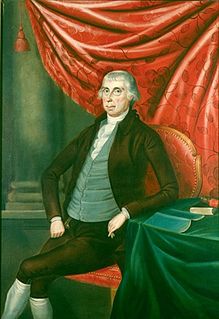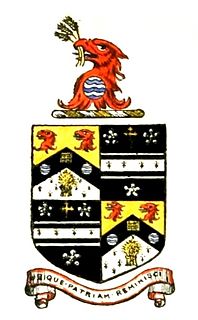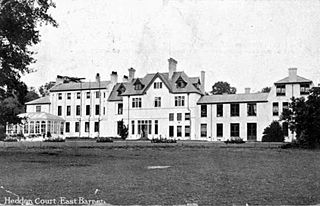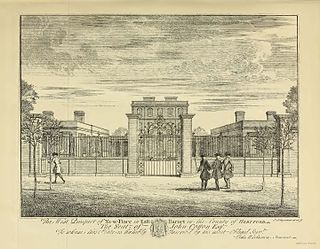
James Fiennes, 1st Baron Saye and Sele was an English soldier and politician, son of Sir William Fiennes and wife Elizabeth Batisford.

Horatio Sharpe (1718–1790) was the 22nd proprietary governor of Maryland from 1753 to 1768 under the restored proprietary government of Maryland.

Col. James Madison Sr. was a prominent Virginia planter and politician who served as a colonel in the militia during the American Revolutionary War. He inherited Mount Pleasant, later known as Montpelier, a large tobacco plantation in Orange County, Virginia and, with the acquisition of more property, had 5,000 acres and became the largest landowner in the county. He was the father of James Madison Jr., 4th President of the United States, who inherited what he called Montpelier, and Lieutenant General William Taylor Madison, and grandfather of Confederate Brigadier General James Edwin Slaughter.
The High Sheriff of Monaghan was the British monarch's representative in County Monaghan, a territory known as his bailiwick. Selected from three nominated people, he held his office over the duration of a year. He had judicial, ceremonial and administrative functions and executed High Court Writs.

Arthur Saunders Gore, 2nd Earl of Arran KP, PC (Ire) styled The Honourable Arthur Gore from 1758 to 1762 and Viscount Sudley from 1762 to 1773, was an Irish peer and politician.

Charles Sackville-Germain, 5th Duke of DorsetKG PC, known as Charles Sackville between 1767 and 1770, as Charles Germain between 1770 and 1785, and as The Viscount Sackville between 1785 and 1815, was a British peer, courtier and Tory politician. He served as Master of the Horse between 1821 and 1827 and again briefly in 1835.

Brownlow North was a bishop of the Church of England.
The High Sheriff of Carlow was the British Crown's judicial representative in County Carlow, Ireland from the 14th century until 1922, when the office was abolished in the new Free State and replaced by the office of Carlow County Sheriff. The sheriff had judicial, electoral, ceremonial and administrative functions and executed High Court Writs. In 1908, an Order in Council made the Lord-Lieutenant the Sovereign's prime representative in a county and reduced the High Sheriff's precedence. However the sheriff retained his responsibilities for the preservation of law and order in the county. The usual procedure for appointing the sheriff from 1660 onwards was that three persons were nominated at the beginning of each year from the county and the Lord Lieutenant then appointed his choice as High Sheriff for the remainder of the year. Often the other nominees were appointed as under-sheriffs. Sometimes a sheriff did not fulfil his entire term through death or other event and another sheriff was then appointed for the remainder of the year. The dates given hereunder are the dates of appointment. All addresses are in County Carlow unless stated otherwise.
The High Sheriff of King's County was the British Crown's judicial representative in King's County, Ireland from 1556, when King's County was created, until 1922, when the office was abolished in the new Free State and replaced by the office of Offaly County Sheriff. The sheriff had judicial, electoral, ceremonial and administrative functions and executed High Court Writs. In 1908, an Order in Council made the Lord-Lieutenant the Sovereign's prime representative in a county and reduced the High Sheriff's precedence. However the sheriff retained his responsibilities for the preservation of law and order in the county. The usual procedure for appointing the sheriff from 1660 onwards was that three persons were nominated at the beginning of each year from the county and the Lord Lieutenant then appointed his choice as High Sheriff for the remainder of the year. Often the other nominees were appointed as under-sheriffs. Sometimes a sheriff did not fulfil his entire term through death or other event and another sheriff was then appointed for the remainder of the year. The dates given hereunder are the dates of appointment. All addresses are in King's County unless stated otherwise.
The High Sheriff of Longford was the British Crown's judicial representative in County Longford, Ireland from the 16th century until 1922, when the office was abolished in the new Free State and replaced by the office of Longford County Sheriff. The sheriff had judicial, electoral, ceremonial and administrative functions and executed High Court Writs. In 1908, an Order in Council made the Lord-Lieutenant the Sovereign's prime representative in a county and reduced the High Sheriff's precedence. However the sheriff retained his responsibilities for the preservation of law and order in the county. The usual procedure for appointing the sheriff from 1660 onwards was that three persons were nominated at the beginning of each year from the county and the Lord Lieutenant then appointed his choice as High Sheriff for the remainder of the year. Often the other nominees were appointed as under-sheriffs. Sometimes a sheriff did not fulfil his entire term through death or other event and another sheriff was then appointed for the remainder of the year. The dates given hereunder are the dates of appointment. All addresses are in County Longford unless stated otherwise.

William Franks was a landowner in East Barnet, Hadley Wood and Cheshunt, and the owner of a large estate in the former Enfield Chace.

Frederick Cass DL was High Sheriff of Hertfordshire, 1844-45. He was resident at Beaulieu Lodge, Winchmore Hill, Edmonton, and later Little Grove, East Barnet.

Arthur Herbert Cass was a British Army officer of the 10th Royal Hussars who fought in the Battle of Chernaya during the Crimean War, winning the medal and clasp.
Charles Addington Hanbury was an English brewer from the Hanbury brewing family and a master of the Brewers' Company in 1857.

Sigismund James Stern was a German-born merchant in the Manchester cotton trade. He was later active in banking in London and owned the Little Grove house and estate in East Barnet to the north of the city.
General John Parslow was a British Army general of the 18th century.











